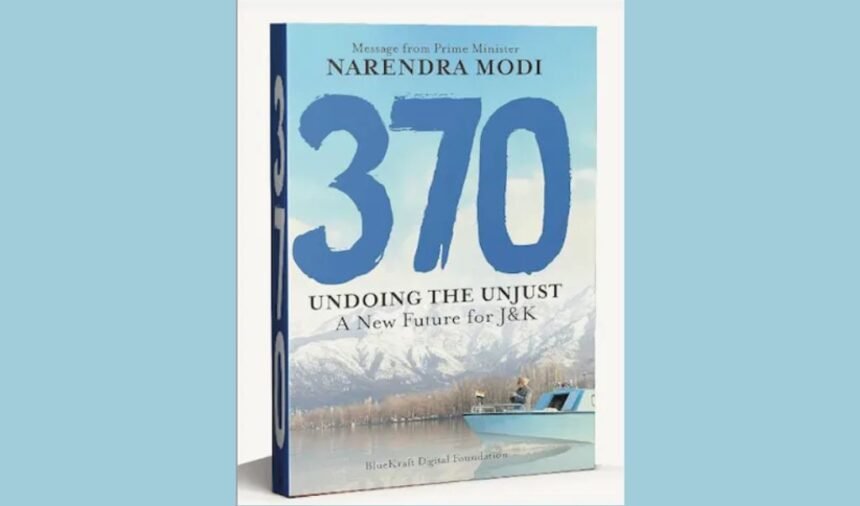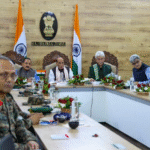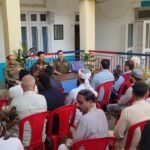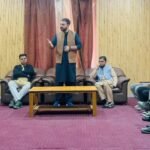The book ‘370: Undoing the Unjust, A New Future for J&K’, published by BlueKraft Digital Foundation, claims that Pakistan’s political experiments in the summer of 2018 may have contributed to Kashmir’s 2019 autumn fallout.
It points to Pakistan’s May 2018 Gilgit-Baltistan Order and the June 2018 13th Amendment to the Azad Jammu and Kashmir Interim Constitution of 1974—both of which sought to tighten Islamabad’s grip by shifting powers from the elected assembly and government directly to the Pakistan government—as possible triggers for the abrogation of Article 370.
In the chapter ‘Sacrificing Government, Enhancing Democracy’ (page 275), the book ‘370: Undoing the Unjust, A New Future for J&K’—with a foreword by Prime Minister Narendra Modi—discusses how India responded to Pakistan’s 2018 constitutional maneuvers in Gilgit-Baltistan and PoJK.
It notes that in May 2018, under caretaker Prime Minister Shahid Khaqan Abbasi, Pakistan introduced the Gilgit-Baltistan Order, which altered the existing institutional setup and effectively integrated the territory with Pakistan “in all but name.” The order shifted crucial legislative powers from local institutions to the Prime Minister of Pakistan, reducing the role of the Gilgit-Baltistan Assembly to an advisory body. Courts were placed under federal jurisdiction, and Islamabad’s direct control was consolidated.
Alarmed by this development, National Security Adviser Ajit Doval briefed PM Modi, warning that the move was “a blatant violation of established provisions.” Modi directed him to “Mahol Banao” (create favorable conditions), emphasizing a comprehensive response. The book highlights that Modi viewed Pakistan’s actions not only as an infringement but also as an attempt to erode Kashmiri identity, potentially weakening anti-India sentiment in PoJK.
Just weeks later, in June 2018, Pakistan passed the 13th Amendment to the Azad Jammu and Kashmir Interim Constitution of 1974. While officially presented as a move toward empowerment, it was widely seen as consolidating Pakistan’s grip over PoJK by curtailing the powers of its assembly and government. The amendment sidelined the AJK Council, created a Council of Islamic Ideology, and restricted political and religious space. However, in practice, it also returned some autonomy to the AJK Assembly, limiting Islamabad’s role primarily to defence, security, and foreign affairs.
The book argues that these developments provided India with an opportunity to question Pakistan’s narrative on Kashmir. It suggests that this shift could have been used to justify the abrogation of Article 370, but PM Modi instead emphasized that any such move would be rooted in governance and development, not as a reaction to Pakistan’s provocations.
On page 276, the book reveals that the process leading to the abrogation of Article 370 and 35-A began in November 2018. Modi instructed Doval to create awareness in Jammu and Kashmir about Pakistan’s attempts to undermine Kashmiri identity, thereby shaping public sentiment and fostering unity across the region.
Subsequently, on February 21, 2019, a file was initiated by Additional Home Secretary Gyanesh Kumar (now Chief Election Commissioner), recommending the issuance of a Constitutional Order to nullify Article 35-A. It was endorsed by Home Secretary Rajiv Gauba and Home Minister Rajnath Singh.
Finally, in August 2019, the Modi government abrogated Article 370 and 35-A, and bifurcated Jammu and Kashmir into two Union Territories—J&K and Ladakh.
The book includes a personal message from PM Modi, who wrote:
“There was complete clarity in my mind that taking the people of Jammu and Kashmir into confidence was absolutely essential. We wanted the decision to happen with their concurrence, not as an imposition.”
Interestingly, the book claims that instead of relying solely on intelligence agencies, the Army, or party leaders, Modi consulted “unofficial ambassadors” such as Hardeep Singh Puri, Moosa Raza, former Governors Jagmohan and Lt Gen S. K. Sinha, and even travel agents. Their inputs confirmed the extent of corruption and governance failures in the state.
The book also recounts Modi’s engagements with Kashmiri youth, businesspersons, farmers, and civil society, where he learned about the impact of “abnormal militarisation,” lack of opportunities, and poor governance. These interactions revealed a widespread demand for jobs, education, private investment, and transparent administration.
According to the book, Modi’s symbolic gestures—such as meeting flood victims and personally interacting with marginalized youth—helped build trust and showcased his intent to directly engage with the people of Kashmir. (Agencies)









